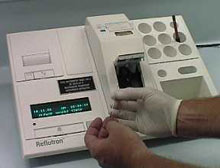aim: A cholesterol test determines the levels of cholesterol, triglycerides and other lipids in the blood, and the results can determine your risk factor for heart disease.
equipment required: blood cholesterol analyzer, blood collection apparatus.
procedure: Depending on what is being tested, you will need to follow a fast prior to the blood being collected. You may also need to stop taking certain medications, particularly those that can affect blood cholesterol levels. Follow the instructions from your doctor. The blood is usually collected from a vein in your arm. The blood sample is then sent to a laboratory for testing. The results are generally available within in a few days or a week. Alternatively, you can use a simple home cholesterol test which measures a small drop of blood taken from a finger tip.
results: The table below shows a general guideline to interpreting the blood cholesterol results for adults. Your doctor may interpret the numbers somewhat differently, or may use different units.
| Rating | Result (mg/dL) | Result (mmol/L) |
|---|---|---|
| Desirable | < 200 mg/dL | < 5.18 mmol/L |
| Borderline high | 200-239 mg/dL | 5.18 to 6.22 mmol/L |
| High | > 240 mg/dL | > 6.22 mmol/L |
 comments: every person over 45, or those with a family history of heart disease, high blood pressure or diabetes should have a cholesterol test. See your doctor.
comments: every person over 45, or those with a family history of heart disease, high blood pressure or diabetes should have a cholesterol test. See your doctor.
Related Pages
- Blood testing
- Blood glucose testing
- The facts about cholesterol in our food
- Other Health Related Tests
- Health Tests for Athletes


 Current Events
Current Events